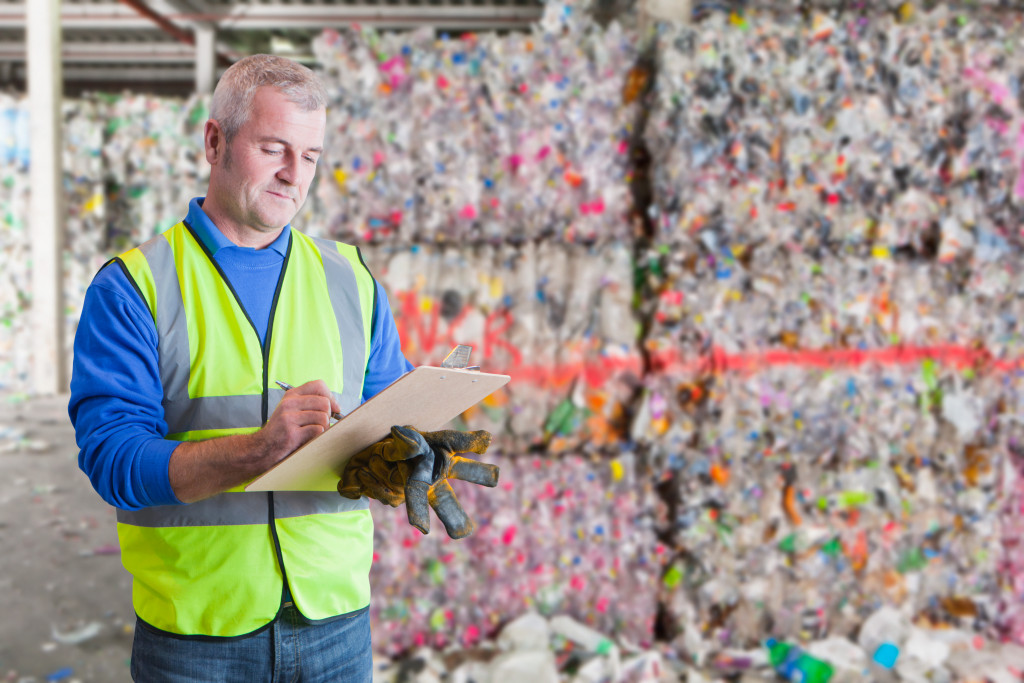- Understand the types of waste generated in your business
- Hire a professional waste management company to help dispose of waste safely and efficiently
- Implement waste reduction strategies such as reducing packaging size & materials, using reusable packing materials, and going paperless
- Familiarize yourself with local waste regulations related to proper labeling, recycling, disposal, and inspections
- Adhere to local waste regulations and use sustainable solutions for a safe, healthy, and sustainable workplace.
As a business owner, you know that keeping a clean and safe environment is essential. Whether providing services or goods, maintaining a hygienic and organized space should always be a top priority. A critical aspect of this is the responsible management of your commercial waste.
Proper management ensures that waste disposal contributes positively to the environment, reduces health hazards that lead to accidents and illnesses, and avoids fees associated with improper disposal methods. Here are some tips on managing and controlling your commercial waste properly.
Understand Your Waste Types
Businesses generate waste in different forms, from hazardous waste to recyclable trash. A clear understanding of the variety of your waste enables you to develop an efficient and effective waste management strategy.
Be sure to include recyclables, organic waste, hazardous materials, and general waste during waste segregation. By handling and sorting the waste your business produces effectively, you create an environmentally conscious workspace that helps reduce the amount of waste that enters landfills.
Hire a Professional Waste Management Company

As a business owner, managing your commercial waste can be a daunting task to undertake. Not only is it time-consuming, but it can also be dangerous if not handled properly. That’s where a professional waste management company comes in. With years of experience and expertise, they can safely and efficiently dispose of your waste while meeting any regulatory requirements.
One of the most popular waste management solutions is skip hire. This service allows you to rent a large container that can be used for storing and transporting your commercial waste. The receptacles come in various sizes, so you can find one that perfectly fits the needs of your business.
Implement Waste Reduction Strategies
One of the best ways to manage commercial waste is to minimize the quantity produced. Strategies that can be implemented include reducing packaging size and materials, using reusable packing materials, and implementing electronic communication that minimizes paper use.
A company that adopts a paperless office system can reduce its waste to zero, save money on paper and ink costs, and conserve natural resources. Another way to encourage reduced waste production is by conducting regular waste audits to identify areas where waste can be cut down.
Familiarize Yourself with Local Waste Regulations
As a business owner or operator, you probably know compliance with local regulations is crucial to avoid legal issues. Waste management is critical to running a successful and ethical business, and local waste regulations are implemented to ensure that companies manage their waste responsibly. Here are some standard local waste regulations businesses in different regions should be aware of, and offer tips on complying with these regulations.
Proper Labelling
Most regions require businesses to label their waste accordingly. The label should include information about the waste, such as the type of waste, the date of generation, and the disposal method. Your business should request that the waste hauler provide clear and concise labeling.
Mandatory Recycling
Recycling is mandatory in most regions since it reduces waste build-up. Depending on your locality, some rules may mandate the recycling of specific materials. For example, some areas only require businesses to recycle paper and plastic waste. It’s essential to be aware of such regulations to avoid legal issues and promote environmentally friendly practices.
Proper Disposal

Improper waste disposal can be hazardous to the environment and human health. Therefore, it’s crucial to have proper disposal methods compliant with local waste regulations. Sometimes, it may be necessary to contract a hazardous waste specialist for disposal or obtain permits from the respective regulatory authority.
Regular Inspections
Regulatory agencies are tasked with ensuring that businesses comply with local waste regulations. Inspections are conducted regularly to monitor compliance. Ensuring your business is always compliant is essential to avoid fines or reputational damage. Regular reviews of waste management practices will identify and correct any non-compliance issues.
The Bottom Line
Commercial waste management is critical to a safe, healthy, and sustainable workplace. Businesses can develop efficient and sustainable solutions by understanding waste types, partnering with professional companies, implementing reduction strategies, and adhering to local waste regulations.
Proper waste management protects the environment and contributes to cost savings for your business. By integrating sustainable solutions such as waste reduction and recycling, companies can positively impact their communities and the planet’s health.
